Fulford Surname Ancestry ResultsOur indexes 1000-1999 include entries for the spelling 'fulford'. In the period you have requested, we have the following 307 records (displaying 21 to 30): Single Surname Subscription | | | Buying all 307 results of this search individually would cost £1,610.00. But you can have free access to all 307 records for a year, to view, to save and print, for £100. Save £1,510.00. More... |
These sample scans are from the original record. You will get scans of the full pages or articles where the surname you searched for has been found. Your web browser may prevent the sample windows from opening; in this case please change your browser settings to allow pop-up windows from this site. Tenants, founders and incumbents of Yorkshire chantries
(1546-1548)
Chantries were established to perform services for the souls of their founders and other faithful dead, including annual obits and anniversaries at which alms were usually distributed. The chantries could be at an existing altar in a parish church, a new altar in a side chapel of an existing church, in a new chapel in the churchyard or some miles from an existing church: few were founded before 1300, and most date from 1450 to 1500. Hospitals were places provided by similar foundations to receive the poor and weak; there were also religious guilds, brotherhoods and fraternities, and colleges (like large chantries at which three or more secular priests lived in common). An Act of Parliament of 1545 gave king Henry VIII the power to dissolve such chantries, chapels, &c., the proceeds to be devoted to the expenses of the wars in France and Scotland. Commissioners were appointed 14 February 1546 to survey the chantries and seize their property, and from 1546 to 1548 the commissioners produced these certificates giving brief details of the establishment and nature of each foundation, with an inventory of valuables and rental of lands. The individuals named in the certificates are thus the founder, the present incumbent, and the tenants whose rents provided the chantry's income. All the surviving certificates were edited by William Page for the Surtees Society, and published from 1892.FULFORD. Cost: £6.00.  | Sample scan, click to enlarge

| Tenants of Somerset chantries
(1548)
Chantries were established to perform services for the souls of their founders and other faithful dead, including annual obits and anniversaries at which alms were usually distributed. The chantries could be at an existing altar in a parish church, a new altar in a side chapel of an existing church, in a new chapel in the churchyard or some miles from an existing church: few were founded before 1300, and most date from 1450 to 1500. Hospitals were places provided by similar foundations to receive the poor and weak; there were also religious guilds, brotherhoods and fraternities, and colleges (like large chantries at which three or more secular priests lived in common). An Act of Parliament of 1545 gave king Henry VIII the power to dissolve such chantries, chapels, &c., the proceeds to be devoted to the expenses of the wars in France and Scotland. Commissioners were appointed 14 February 1546 to survey the chantries and seize their property, and in 1548 the commissioners in Somerset produced this survey and rental. The individuals named are the tenants whose rents provided the chantry's income: occasionally an incumbent is named. The survey was edited by Emanuel Green for the Somerset Record Society, and published in 1888.FULFORD. Cost: £4.00.  | Sample scan, click to enlarge

| Tradesmen of York
(1272-1558)
No man or woman could trade in the city of York without having obtained 'freedom' of the city.Their names were recorded on the 'Freemen's Roll', or Register of the Freemen of the City of York, which contains about 19,900 names for this period. A list of names was prepared for each year, the year being here reckoned as starting at Michaelmas (29 September) until 1373, and thence at Candlemas (2 February). Each annual list starts with the name of the mayor and the camerarii or chamberlains. The chamberlains were freemen charged with the duty of receiving the fees of the new freemen; of seeing that only freemen traded in the city; and of preparing this roll, which was compiled from the names on their own account books from the receipts for the fees. There are three groups of freemen: those who obtained freedom after serving out an apprenticeship to a freeman; the children of freemen; and those who claimed freedom by 'redemption', i. e. by purchase or gift from the Mayor and Court of Aldermen.
FULFORD. Cost: £2.00.  | Sample scan, click to enlarge

| Liegemen and Traitors, Pirates and Spies
(1580-1581)
The Privy Council of queen Elizabeth was responsible for internal security in England and Wales, and dealt with all manner of special and urgent matters
FULFORD. Cost: £4.00.  | Sample scan, click to enlarge
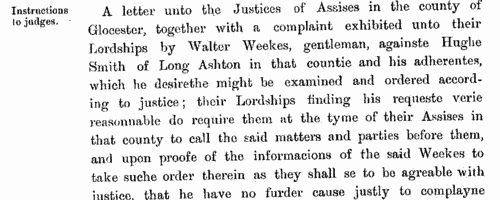
| Ambassadors, ministers, soldiers and spies
(1588)
The State Papers Foreign of queen Elizabeth consist mainly of letters and reports concerning England's relations with continental Europe. July to December 1588.FULFORD. Cost: £6.00.  | Sample scan, click to enlarge
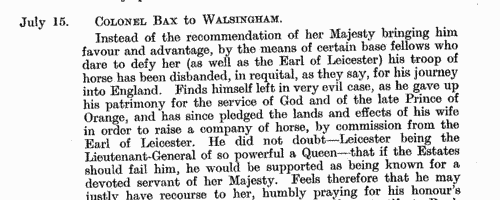
| Liegemen and Traitors, Pirates and Spies
(1588)
The Privy Council of queen Elizabeth was responsible for internal security in England and Wales, and dealt with all manner of special and urgent matters
FULFORD. Cost: £4.00.  | Sample scan, click to enlarge

| The English in Holland and Flanders
(1588)
The State Papers Foreign of queen Elizabeth consist mainly of letters and reports concerning England's relations with continental Europe. The inhabitants of the Low Countries were at this period attempting to throw off the Spanish yoke, and Elizabeth sent considerable forces to their aid. The papers relating to Holland and Flanders in the State Papers Foreign are so voluminous in consequence, that a separate calendar was edited by Sophie Crawford Lomas and Allen B. Hinds under the direction of the Master of the Rolls, this volume, covering January to June 1588, being published in 1931. FULFORD. Cost: £4.00.  | Sample scan, click to enlarge
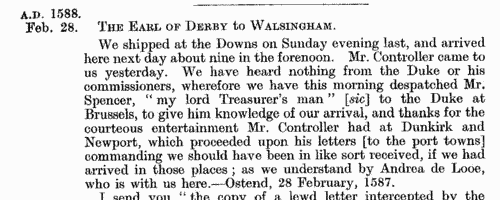
| Liegemen and Traitors, Pirates and Spies
(1588-1589)
The Privy Council of queen Elizabeth was responsible for internal security in England and Wales, and dealt with all manner of special and urgent matters
FULFORD. Cost: £4.00.  | Sample scan, click to enlarge
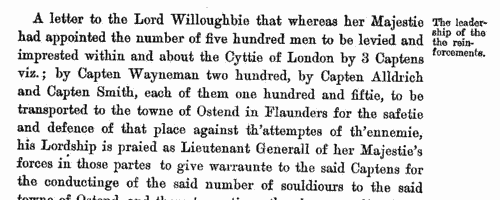
| Ambassadors, ministers, soldiers and spies
(1589)
The State Papers Foreign of queen Elizabeth consist mainly of letters and reports concerning England's relations with continental Europe, particularly the Netherlands and France. January to July 1589. FULFORD. Cost: £4.00.  | Sample scan, click to enlarge
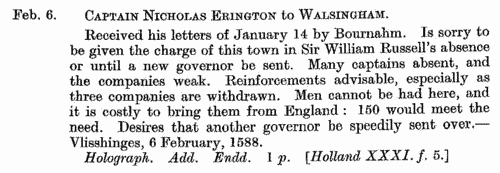
| Liegemen and Traitors, Pirates and Spies
(1592)
The Privy Council of queen Elizabeth was responsible for internal security in England and Wales, and dealt with all manner of special and urgent matters
FULFORD. Cost: £4.00.  | Sample scan, click to enlarge

|
Research your ancestry, family history, genealogy and one-name study by direct access to original records and archives indexed by surname.
|












